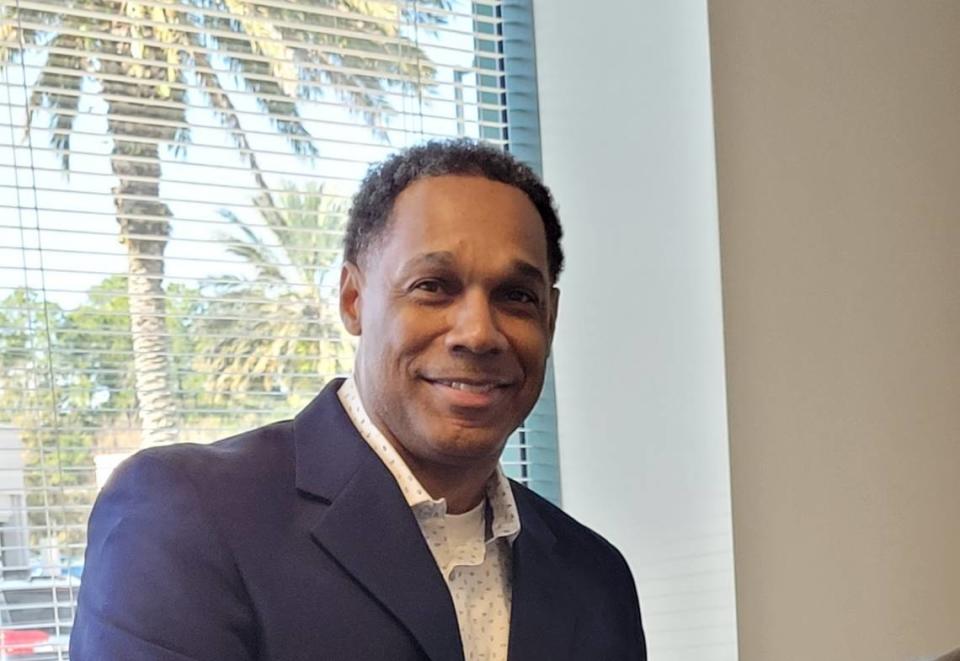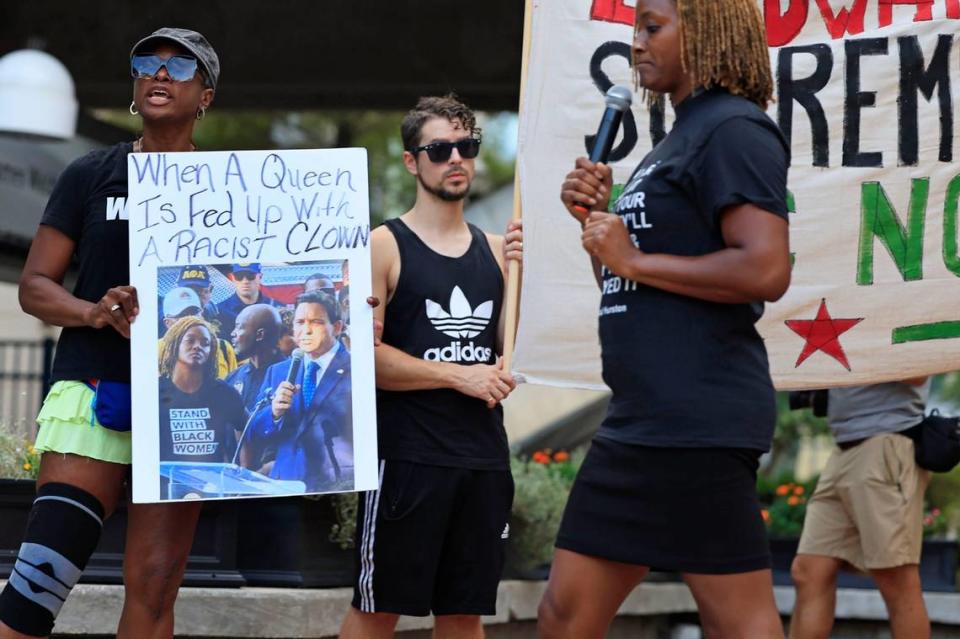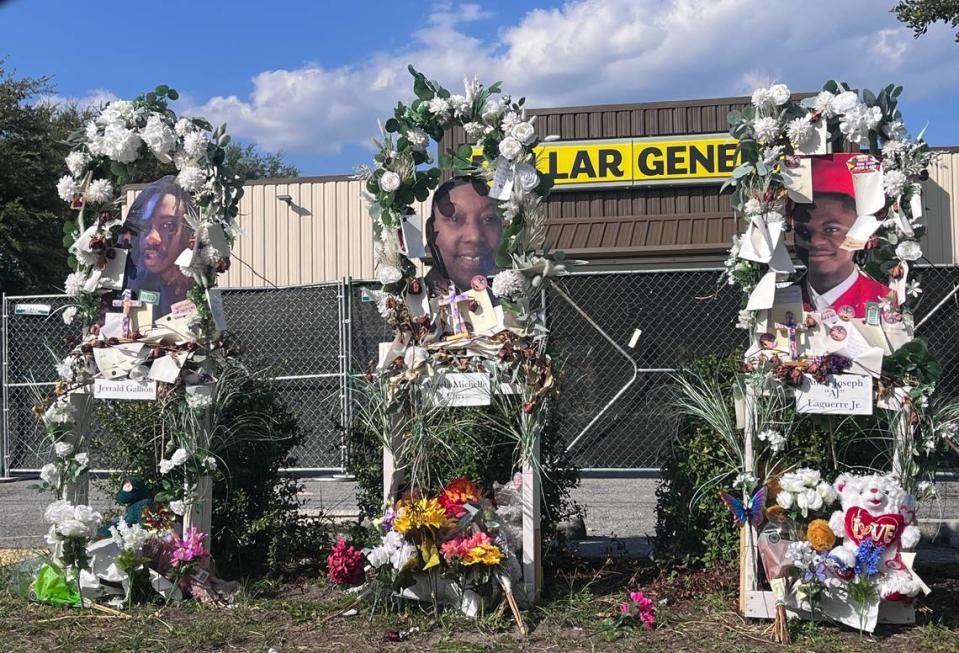In the last month, Jacksonville has become ‘ground zero’ for resistance to DeSantis’ policies
- Oops!Something went wrong.Please try again later.
Timothy Robinson doesn’t necessarily consider himself a “political person.”
His interests lie elsewhere. The Pittsburgh Steelers. A good sermon. The chicken shawarma at Wafaa & Mike’s Cafe in Jacksonville. Robinson did, however, fight for this country — he said he served in the Army for about 16 years and the Air Force for another five — before his current job as a federal employee.
Which is why Robinson ended up at a Sept. 7 press conference on the southside of Jacksonville looking to talk to Gov. Ron DeSantis, veteran to veteran. All he wanted to do was ask DeSantis a simple question in the wake of the Aug. 26 racist killing of three Black people: Can you change your ways so that everybody in the state can feel safe and peaceful?
“It broke my heart,” Robinson said of the shooting, seated inside the booth at Wafaa & Mike’s. The killing — specifically that one of the victims wasn’t much younger than his son — had motivated him to speak out that day. And he did, telling DeSantis that his policies “have allowed people to hunt people like me.” DeSantis called his statement “nonsense” before Robinson was escorted out.
“Death is a part of life but like that...,” Robinson continued, his voice trailing off briefly. “And then the response from the state’s leaders just made it worse.”

Over the past month, Jacksonville has been home to various acts of defiance against DeSantis in the aftermath of the senseless killing of Angela Michelle Carr, Jerrald Gallion, and Anolt Joseph Laguerre Jr. As Desantis continues to pass policies that attempt to whitewash Black history education, influence how Floridians are allowed to discusses racism and redraw congressional maps, Jacksonville has become a place where the conversation on how to push back has grown louder.
State Rep. Angie Nixon, who represents the Jacksonville area, has been a vocal critic of DeSantis since joining the Legislature in 2020. She told the Miami Herald after the Aug. 26 killings that DeSantis has created “an atmosphere that emboldens racists and Nazis,” later adding, “marginalized people don’t feel safe here.”
A few days after Robinson’s interaction with DeSantis, several organizations based along the Eastern seaboard came to Florida for protests, including Repairers of the Breach who marched in Jacksonville and in Tallahassee where they delivered a cease and desist letter to the governor. And last week the Association for the Study of African American Life and History (ASALH) held its 108th annual conference in Jacksonville, in spite of the NAACP’s calls to boycott the state. The theme of the conference: resistance.

“Having ASALH in Florida was a defining moment to upholding intellectual freedom,” said Paul Ortiz, a history professor at the University of Florida who attended the conference. He was very vocal about ASALH coming to Florida because the people fighting against DeSantis’ policies need allies and “ASALH represents the alternative for that. Let’s come clean on the history of inequality.”
The conference, which ran from Sept. 19-24, brought out Black Studies educators from across the country for an exchange of ideas but also a sense of community. Across numerous sessions, attendees learned everything from how to teach the history of Black joy and resistance to how the University of Florida is dealing with DeSantis’ policies to the importance of Black historical preservation.
“It was fortifying,” Nadege Green, the founder of the digital archive Black Miami-Dade and a former Miami Herald journalist, said of her experience. She compared the conference to “a family reunion around Black history.”
“It reminds you of your roots. It reminds you of where you come from. You get to connect deeper and that’s what we did: we got to connect deeper, we were fortified and we were reminded that this work has always been, it is and always will be.”
‘They did whatever was necessary to bring about change’
The campus of Edward Waters University buzzes with excitement.
It is game day and the Tigers’ football team appears en route to its first victory of the season. The smell of grilled chicken and cigar smoke greets fans headed to Nathaniel Glover Community Field & Stadium. Four firefighters take in the game from the top of their engine parked at the south end zone. Fans hold up the four fingers at the start of the fourth quarter, the sound of laughter and cheers ring in the air.
Only a month has passed since Ryan Palmeter came on to the campus of Florida’s first historically Black college or university with the intention of committing mass murder. The students’ proactiveness ultimately saved the day: after campus security was notified of a suspicious man inside a car, the officer approached the vehicle and Palmeter fled a few blocks away to a Dollar General where he fatally shot Carr, Gallion and Laguerre Jr. before turning the gun on himself.
Less than a mile from the stadium is a memorial constructed right in front of that Dollar General. Three pillars adorned with white flowers, crosses and pictures of each of the victims sit before the fence that closes off the store. An array of flowers and teddy bears lay at the feet of the memorial. The scene is a reminder of how difficult the last month has been for the city of Jacksonville.

“It’s just a very heavy, trauma-filled time,” said Diamond Wallace, a Jacksonville native and the vice president of Jewels of the Future, an organization that focuses on mentorship of girls. “It feels so back against the wall because there’s a million things happening. We’re dealing with attacks not only at the local level in our city but we’re dealing with attacks from our state government.”
Despite these attacks, there’s a sense of hope represented by organizations like ASALH and Repairers of the Breach which, according to Wallace, shows “our fight isn’t going to waste.” ASALH held a banned book read-out Thursday in James Weldon Johnson Park that attracted more than 200 people. Wallace recited a passage from Zora Neale Hurston’s “Their Eyes Were Watching God.” Attendees included Angela Davis, renowned anthropologist and college president Johnetta B. Cole and former Student Nonviolent Coordinating Committee activist and author Charlie Cobb Jr.
“They came here and told us that the reason they’re coming is because of the attacks [Jacksonville] received,” said Wallace, who also serves as the chapter leader for Dream Defenders Jacksonville, a non-profit organization that aims to end policing and abolish prisons. “They’re not scared to run to a fight and in Jacksonville, that’s exactly what we need right now. It felt empowering.”
Said Ortiz: “To feel that kind of fighting spirit that Carter G. Woodson modeled for us was just incredible.”
The banned book reading took place near where Ax Handle Saturday occurred, the 1960 sit-in where Black demonstrators were attacked by 150 white men armed with ax handles and baseball bats. As Wallace said, Jacksonville has long “felt like ground zero” for political action.
Robinson wasn’t necessarily familiar with that history until moving to Jacksonville for his new job in 2018. His involvement in the fight came after confronting DeSantis. He felt the energy of the room become venomous amid the tense exchange. He heard how the state surgeon general appeared to call him “crazy.” And after the press conference finished, he said some of the attendees even hurled nasty words in his direction.
“My body was hurting,” Robinson recalled of the days following the experience. “I’m in pain anyway. I’m a 100% disabled veteran from combat but that was a different kind of pain. I was feeling all that anger and bitterness and hatred from those people and the governor.”
So he participated in the Repairers of the Breach march, wearing a sign that read “We Demand Cease & Desist From Division & Hate.” He planned to meet with Nixon, the state legislator. Robinson’s mission — much like that of ASALH — was to continue the tradition of resistance.
“Our predecessors marched, they sat, they did whatever was necessary to bring about change,” Robinson said.

